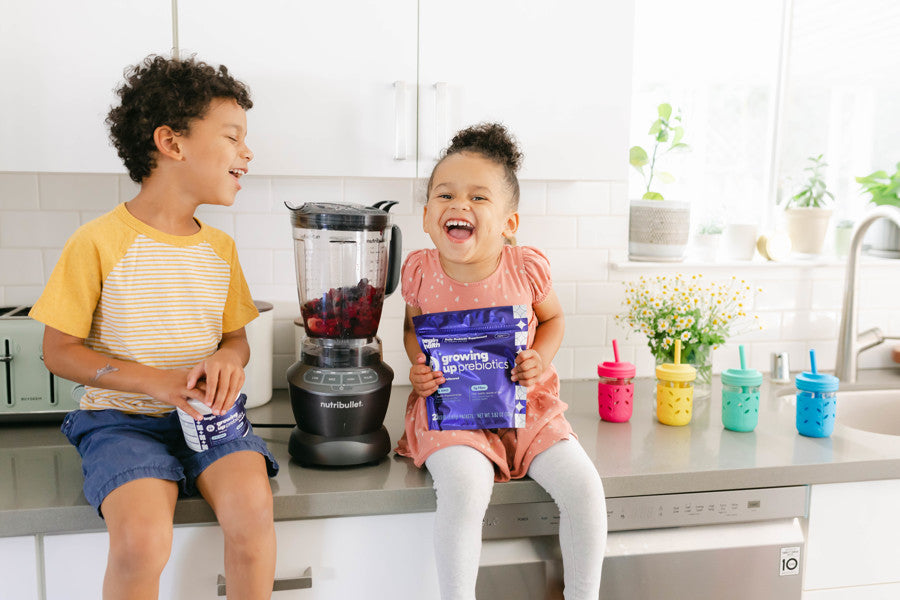Your Cart is Empty
Continue shoppingMagnesium Supplements for Toddlers: Does It Help with Constipation?
How to Determine if Magnesium Supplements are Right for Your Toddler.
Expert reviewed by Lauren Mahesri, RDN | Published December 12, 2024
share this article

If your toddler is struggling with constipation - you aren’t alone! Up to 30% of kids are affected by constipation (1).
One major piece in the constipation management plan is magnesium - a naturally occurring mineral found in food that is often sold in a supplement. But is a supplement necessary? And will it work to relieve your toddler's constipation?
Let’s review what might be the root cause of your toddler’s constipation, how magnesium might improve their gut health, and how to use a magnesium supplement safely and effectively for your toddler.
Constipation Culprits in Toddlers
There are a variety of reasons that might cause constipation in your toddler. The most common are:
- Low fiber. Nearly 95% of kids do not meet their daily fiber needs (2). Because fiber acts to feed the good bacteria in our gut and improve the lining of our intestines, a lack of fiber is quick to cause constipation.
- Diet changes. Toddlerhood comes with big changes to their diet - stopping breastfeeding, introducing new foods, learning to chew, etc. With this, comes some digestive kinks along the way.
- Dehydration. The big change from breastfeeding to introducing water can be a struggle for some toddlers and can even result in dehydration. This makes their stool harder and harder to pass through their intestines.
- Withholding stool. As toddlers become potty trained, withholding stool is quite common. Whether it’s due to a traumatic experience (like a painful poop) or simply getting distracted while on the toilet, withholding can contribute to their constipation.
- Magnesium deficiency. Toddlers with low intake of magnesium-rich foods are more likely to be constipated (3).
How Magnesium Can Relieve Constipation Symptoms
Magnesium is an essential mineral naturally found in food that can reduce constipation symptoms by softening the stool.
In the form of magnesium oxide and magnesium citrate, it becomes an osmotic laxative in our digestive tract. This means that it pulls water into the intestines to help soften the stool and promote regular bowel movements.
Unlike other laxatives, magnesium is not something that becomes less effective the longer you take it (4).
Magnesium in Food vs Magnesium Supplements
Based on the 2020-2025 Dietary Guidelines for Americans, toddlers ages 1-3 should consume 80mg of magnesium daily to avoid deficiency.
To put this amount in perspective, some of the top magnesium-rich foods include:
- Pumpkin Seeds (1oz = 156 mg)
- Lima Beans (1 cup cooked = 126 mg)
- Brown Rice (1 cup cooked = 86 mg)
- Spinach (½ cup cooked = 78mg)
- Almonds (1oz = 77 mg)
- Dark Chocolate (1oz = 65 mg)
- Avocado (1 whole = 58 mg)
- Banana (1 whole = 32 mg)
If you have a particularly picky toddler who does not eat any of the above foods, they might struggle to meet their daily magnesium requirements, which is where a supplement may be helpful.
The National Institute of Health recommends toddlers ages 1-3 should not consume more than 65mg of additional magnesium through supplements.
Because this amount is much lower than the average magnesium supplement (300-600mg), consult your toddler’s pediatrician before starting a magnesium supplement.
Begin Health Expert Tip
Got a picky toddler in the house? Here are 10 strategies to Tackle Picky Eating from a Pediatric Registered Dietitian.
Magnesium Supplementation for Toddlers
If a magnesium supplement is appropriate for your toddler, there are a couple things to consider when choosing a supplement:
- Consult your Pediatrician. Over-the-counter magnesium supplements might be in too high of a dose for your toddler. Discuss with your toddler’s pediatrician about an appropriate starting dose.
- Form of Magnesium.There are 11 forms of magnesium, each serving a unique purpose in the body. Magnesium oxide and magnesium citrate are the two forms most suitable for relieving constipation symptoms in toddlers. They both provide a gentle laxative effect by pulling water into the intestines, making the stool softer and easier to pass.
- Monitor for Symptoms. Too much magnesium can lead to diarrhea and stomach cramping. If these symptoms occur, stop the supplement and contact your pediatrician.
Kids with heart disease, kidney disease, or a known calcium deficiency should not take a magnesium supplement without their doctor’s supervision.
Begin Health Expert Tip
Wondering which type of magnesium is the best for a healthy digestion? Check out what our dietitian has to say in this blog here.
Alternatives & Enhancements to Magnesium
Beyond magnesium, there are other ways to improve your kid’s gut health and reduce constipation symptoms.
- High-Fiber Foods. Introducing more fiber into your toddler’s diet can lead to less painful and more frequent poops. Fiber helps to add bulk to the stool in our intestines and absorb water to make it softer and easier to pass. Try introducing some high-fiber foods like raspberries, chia seeds, pears, beans, or avocado.
- Probiotics. Probiotic-rich foods and probiotic supplements help replenish the good bacteria in your toddler’s gut. This can move things along quicker in the digestion tract and even signal hormones that aid in digestion (5).
- Prebiotics. As the food for the bacteria in our gut, prebiotics can help replenish a healthy ecosystem in your toddler’s tummy. The chicory root fiber and human milk oligosaccharides (HMOs) in Growing Up Prebiotics can improve stool consistency, stool frequency, and reduce pain while stooling within 6 weeks of daily use (6).
Summary
Magnesium can be used as an effective and natural remedy as a part of constipation support in toddlers. If your toddler is not meeting their magnesium requirements through food, a magnesium supplement may be a helpful alternative.

Author
Lauren Mahesri, RDN
Trending

How to Transition Kids Off Stool Softeners Safely
read now
How to Know If Your Kid Needs a Stool Softener (or Something Else)
read now
Why Parents Are Choosing Prebiotics Over Stool Softeners for Kids
read now






